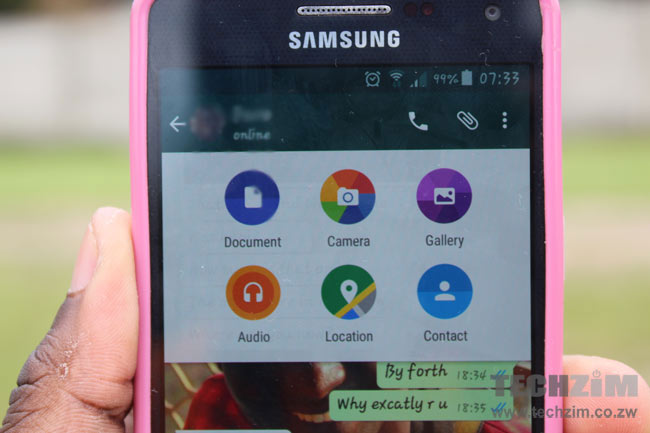POTRAZ just confirmed something that we’ve always assumed. Zimbabweans use WhatsApp more than any other broadband service or application.
According to the latest report from the telecoms regulator, the Instant Messaging (IM) platform’s bundles accounted for 34% of mobile broadband traffic in the fourth quarter of 2015.
This dwarfs the 3% registered for Facebook bundles use and though it comes second to the 63% recorded for “Other Data Usage” it paints a very clear picture of how dominant the service is in determining Zimbabwe’s broadband use.
POTRAZ’s report only highlighted WhatsApp bundles use, which in effect, shows an even greater data use for the chat service. These bundles are only available to prepaid broadband users, so any postpaid or contract line subscribers who use WhatsApp actually add to that 34% total.
The popularity is hardly surprising, though. WhatsApp bundles, which were first introduced to Zimbabwe by Econet Wireless in 2014 and adopted by the other two operators, Telecel and NetOne, enable “unlimited” access to the IM service.
Mobile operators introduced the bundled service as a way of monetising the service especially since it had, like other Over The Top services like Skype, accelerated the decline of voice revenue.
The bundles became a huge hit because of their value proposition to the Zimbabwean “mobile internet elite” which struggles with high broadband costs and limited disposable incomes due to the tough economic environment.
A $3 monthly subscription guarantees access to a service that has voice calling and chat capabilities even when a subscriber fails to top up with conventional data.
However, WhatsApp’s appeal doesn’t just lie in the data budget and economics. Thanks to its multimedia capabilities, the service has become arguably the most relevant tool for sharing images, audio and video content, a functionality that has been exploited by content creators and anyone else trying to share the latest joke or viral clip.
Another feature, WhatsApp Documents, which was introduced a fortnight ago has also added to “App’s” appeal, and it won’t be long before that too is used by thrifty Zimbabweans as a way of eliminating costs and adding distribution efficiencies.
WhatsApp bots, which add to the functionality of the application by patching in web services like Wikipedia, news alerts, and weather updates have also emerged on the scene, with pockets of users relying on these workarounds just to squeeze as much broadband as possible from WhatsApp bundles.
More evidence for the net neutrality argument
In the absence of net neutrality regulations against bundled services, with no indication of lowered broadband prices and with the continual addition of functionality (whether officially or through hacks), it looks like WhatsApp bundles are only going to become even more popular.
While it may be great that WhatsApp bundles offer people a convenient way to access the internet at a discount, the fact that they shape broadband access patterns is a major concern.
WhatsApp’s popularity and product quality have never been a point of contention, but the way these bundles have come to dominate the portrait of Zimbabwean internet use in just two years is an uncomfortable thought, especially when you consider the rest of the internet that is being passively sidelined.
An uneven access to parts of the internet actually moves people away from the rest of the web and if Zimbabwe is to fully harness the opportunity of the internet it has to look beyond WhatsApp, no matter how cheap or convenient it is.

10 comments
I wonder how many people are using secure messengers (Signal, Threema, etc.) here.
WhatsApp on Android (domininant platform in Zim) uses end-to-end encryption[1] for one-to-one chats. Group chats and other non-Android platforms are not encrypted end-to-end, but it’s better than nothing
1. https://whispersystems.org/blog/whatsapp/
These bundles work fine for the first hours, days, weeks if you subscribe for the daily, weekly, monthly bundle respectively. After that they are absolutely rubbish, you can’t even donload a 100kb image!
Its sad really. Such a position is terrible as it hinders innovation and cuts out the true benefits of what the internet has to offer.
Can we not start an online petition to address the issue of net neutrality in Zimbabwe and Africa aimed at telecom regulatory bodies. A petition that puts a more heated debate on the issue not this lackluster stance POTRAZ is adopting.
There already is a lot of ongoing works, starting a new campaign might not be the best thing to do, but supporting the active initiatives through whatever means, for a start, you can check the African Declaration on Internet Rights and Freedoms, google it up
Change your title, don’t confuse network traffic with the Internet. The Internet is something totally different from WhatsApp. WhatsApp uses neither the HTTP nor the HTTPS protocols. Have you surfed the web on WhatsApp, or posted something on Facebook? Please remain techinically correct.
They are technically correct…you on the other hand need to revisit the meanings of some of these terms
@Tapiwa Is there a way to verify that Android-to-Android messages are actually end-to-end encrypted, or do we have to take WhatsApp’s word for it? (Threema, for example, offers a means of independently verifying that the encryption takes place.)
I’d say it is impossible to prove that Threema has end-to-end encryption. Proving that just ‘encryption’ happens is simple enough (look at the network traffic), but how can you prove that the Threema’s server do not have a copy of the decryption key. I trust Open Whisper systems, and I especially trust Moxie Marlinspike, so I’m willing to give WhatsApp the benefit of the doubt.
When it comes to proof – I will only trust open source application rather than close source ones (not WhatsApp, not Threema or Signal)
@Tapiwa Isn’t Signal open source? Why don’t you trust it? Concerning Threema: An external security audit confirms that the private key isn’t stored on any other place than the user’s device. BTW did you ever review the source code of an app like the one’s we’re talking about here?